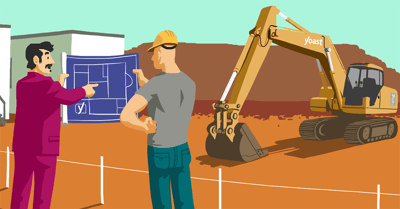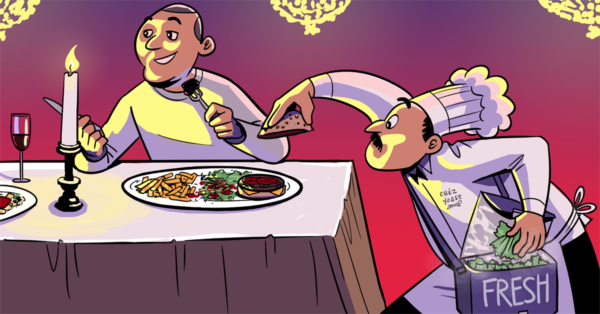Optimizing a single page: One page website SEO

One page websites have been popular for some time now. Basically, it’s your entire website on your homepage. It’s fancy, it’s streamlined. By dividing your homepage into multiple sections, and adding a menu that allows visitors to jump to the section they want to visit, you create an entire website experience on that one single page. Having just one single page also means that you probably need to rank that page for multiple keywords. And that’s where one page website SEO differs from regular website SEO: there are just fewer things you can optimize.
Why use a one page website?
Truth be told: I don’t like one page websites. There are a lot of people that like all their content crammed into one page, but I just can’t see the benefit of it. The page loads slower, there is less focus, I detest loading the JavaScript/CSS scripts that make unnecessary visual movements or automatic scrolling possible. Don’t get me wrong: there’s nothing against having long pages. I love ’em and write ’em. But I’d like to keep these pages focused on one subject.
One page website SEO tips and tricks
Is there anything you can do to optimize your one page website for SEO? Of course, there is. There always is. I’m just not sure you’ll enjoy that single page website for your company in the long run. One page website SEO is tough. I think the only reason you’d want a website like that, is when you need to set up a quick promotional site. Say for a particular product or a temporary collaboration with another brand. In that case, you’ll be driving traffic from flyers, TV ads and the works, and are less dependent on search engines.
If you insist on using a single page website, you need to pay attention to the way you set things up.
Optimize per section
Before starting to write your content, you need to do some keyword mapping. As you have only one page to tell your story, group related content. Create a <div> or <section> for each keyword and assign a proper ID to it. If a section is about trimming hairy dogs, use trim-hairy-dogs as the ID, as this will be like the slug of that particular section. Your internal links on that page will link to example.com/#trim-hairy-dogs. Choose that slug wisely.
That section needs content and a heading and as we think of all these sections as “pages”, you should add an <h1> tag to these sections. That indeed means multiple H1s per page, but hey, you wanted an unfocused website.
If you use images, optimize image file names and ALT tags per section as well.
Optimize page speed
This one is vital for your one page website SEO: optimize page speed. It’s even more critical if you have a page like that since you are serving all kinds of different sections with possibly all types of different layouts and design elements, so your page doesn’t look like a Word document, right? Most of these elements simply take time to load, and you want to optimize that. Here are some articles that will help you optimize speed.

Fresh content for the win
You are probably still not convinced that you’d better create multiple pages on your website. But you will understand single page website SEO is pretty hard and limited. You have one page in search result pages, one canonical link, one page that needs to rank for everything you want to rank for. Fresh content, dynamic content, is always a good idea and it is possible on a one page website. Rewrite your sections now and then to align them with current events, for instance. If your website is set up once, and never changes, you have this one static page that needs to do all the work. Changing its content from time to time will certainly help.
One more thing: Analytics
It is possible to track internal links on that page: track per section. But that’s fairly hard for the average Google Analytics user. And Google would rather track per page as well, judging from this article. This is yet another reason why I don’t like one page website SEO. It’s harder to implement SEO recommendations and harder to analyze your efforts.
Come to think of it; it’s probably your PR agency or sales department that likes that one page website so much. So please, please reconsider setting up a page like this. It’ll make your SEO so much easier.
Read more: Why every website needs Yoast SEO »


This is really awesome.Useful information thank you
Hi Michiel..
Thank you for sharing with us this great information, I am using yoast plugin for all of my website,, I don’t say it’s easy to rank with it but didn’t that hard either.. Well i do really loves using Yoast seo plugin..
Based on my experience from these past years, the on page seo content by yoast are extreamly powerful..
One question Michiel, can you give us your thought about the new SEO update by google.. Is there any mayor changes? Thank you so much,
Regards, Andrew
I am using Yoast plugin which always helps me with the on-page seo.
I dont write about technical stuff and kind of response I got from the plugin is great.
So far I have learned that if the content is unique and it has some meaning to it. It can rank way better on the search engine.
Thanks for this in-depth article.
Keep up the good work. :)
This is making me want to redesign my one-page portfolio website. I guess it was due for a change, anyway. Thanks for the tips.
You’re welcome and good luck, Cody!
Hi Michiel,
i partly disagree:
1) Most one-pages aren’t real one-pagers because often there is an additional blog etc.
2) In local SEO when the website offers one special service (e.g. gardener) and your site won’t outrank big competitors on a non-local level – then a one-page-website might be the fitting solution. –> Do you agree?
Felix
Hi Felix,
Thanks for your comment.
1) So that depends on the definition of a one-page website, right? If a so-called one-page website contains blocks that link to separate pages containing more information on a specific subject, some call it a one-page site, but in fact, it’s not and a perfectly workable approach. For just the blog, I’d say that depends on the way you optimize your blog for keywords.
2) That would almost make it a promotional page for a specified target audience (local), which makes sense, especially when you also promote that page (heavily) offline.
I don’t think we disagree that much :)
Yoast Seo transforms novices like me into SEO professionals ∞
That’s awesome, Cristina!
I’ll be glad if you tell me. How do you calculate the ROI on SEO?
Nice topic for a new post, Aarusys! We’ll make a note :-)
The one-page website can be a great solution for one event, or a one service I think. The rules we can use for this type of website:
– a great URL
-title
-description
-H1
-H2
-great content
-media(images with a great name and alt, videos)
-speed
-backlinks
Hey Michiel!
I think it’s good to know how to do this one-page website SEO. I agree with you, I don’t see the benefits of a one-page website neither. I don’t think that is a smart idea. But, to each its own, right.
Thanks for sharing these tips, though!
Have a nice weekend! :D
Glad you agree, Freddy! Great weekend to you too
Hi, this is Murat from Turkey. In order to use multiple H1s on one page, there can be smart way to optimize all keywords in one H1. Since one page website will be on the same topic, i think it will worth trying to optimize the topic in one H1. However, if it is not possible, Google also announced that there can be multiple H1s on a page.
Hi Murat, You need to have a very focused page to have all your keywords stuffed in one H1 and for it to still be a nice readable, user-oriented heading. Probably multiple H1s makes more sense, which isn’t best practice though. So this is the dilemma… As you might have noticed we’re not really a big fan of one page websites ;-)
Many changes in SEO community , lots of up and down and I think in 2018 the seo algorithm is going to get more sharper on on page seo. It really matters that website should have well organized article include proper heading and unique content.
Thanks yoast team for making everything easy from you plugin . Its so so easy to make great one page seo content .Time has gone and now we dont need to think more on link building . Onplage seo more weight than offpage seo.
Great Article Share Michiel
Glad you appreciate our plugin and the article, Bigey!